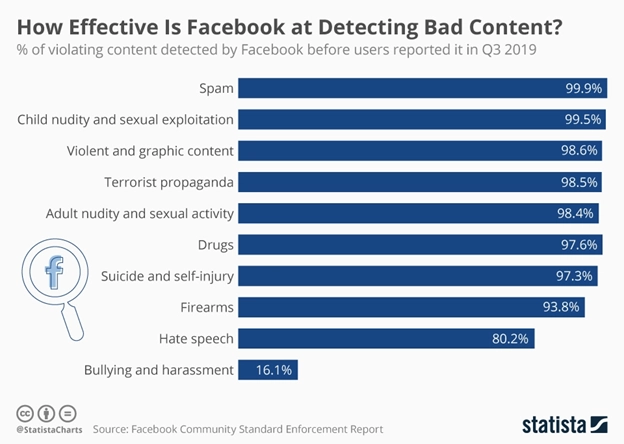The Role of AI in Facebook
Being the world’s largest social network, Facebook is a company that heavily relies on artificial intelligence. Ever since day one, it has taken the power of data very seriously and continues to build its superstardom around it.
CEO Mark Zuckerberg has famously vowed to one day solve significant world problems with the help of AI. As a result, multiple Facebook AI labs are dedicating their resources to research and projects to drive the company’s operations toward a more AI-centered environment.
The truth is that a regular user may not even notice how much of what he already sees on his feed is connected to AI. Currently, the social network uses AI to tackle content that is not compliant with its rules and regulations. In addition, hundreds of data scientists worldwide are endlessly working on projects to implant more AI-driven features in Facebook. So why is Facebook increasingly paying so much attention to AI? Is Artificial Intelligence the key to genuinely connecting people from all over the world?
Usage of AI in Spotting Bad Content
Spam
By far, Facebook’s AI game is winning at detecting spam content. Spam involves anything from receiving bulk messages and friend requests from unknown users to posting deceptive links on your timeline. Facebook’s AI technology sorts all types of content into different categories. It automatically spots and flags unwanted content most of the time before the user suspects something and flags it herself. However, it still sends some questionable content to its human moderators, who may decide to remove it from the network.
Nudity and Sexual Exploitation
Images depicting adult nudity and sexual activity are banned on Facebook, and the company’s AI team is actively working on taking down this type of content as soon as possible. As a result, it has successfully removed 31.8 million posts involving nudity during the first three months of 2021. This was a remarkable increase from the preceding three months when it pulled out 28.1 million pieces of the same sort.

Likewise, Facebook’s Artificial Intelligence tools battle against child nudity and sexual exploitation. In 99.5% of the cases, the app wouldn’t even let you post or immediately remove anything that shows the nudity of minors.
Facebook has periodically made adjustments to its AI technology revolving around nudity. For example, it is currently modified to distinguish between different contexts of depicting a female breast. As a result, it will keep breastfeeding images for educational purposes but remove inappropriate ones.
Terrorism and Organized Hate
A proactive detection technology powered by AI takes down content that praises, supports, or involves people engaging in terrorism and organized hate. The software removed 40% more terrorist content in the second quarter of 2020 than it did in the first quarter. Don’t expect to find any texts or images that induce or depict death, support for internationally recognized terrorist organizations, or other media that shows physical violence against anyone.
Suicide and Self-Injury
Suicide, one of the leading causes of death among young people, is Facebook’s main target for prevention. It uses machine learning to get help to those in need on time. The tool identifies people at risk of suicide by scanning posts for trigger words. Posts that include trigger words such as “kill,” “die,” and “goodbye” are potentially under evaluation by Facebook’s AI labs.
Recognizing real suicide threats is a tough job, even for AI. For example, the machine may flag a phrase such as “I’m so tired, I wanna kill myself” as a possible self-injury claim. But in reality, the user is most probably joking around. Thankfully, the AI team has successfully managed to modify the algorithm and leave harmless messages untouched. Yet, there is still some work to do to target threats with more precision.
Hate Speech and Bullying
Freedom of speech is a fundamental human right, but it can have severe consequences if used to cause harm or spread hate. Unfortunately, one of the most common reasons that keep many people away from Facebook is excessive hate speech and bullying. Compared to the 24% of hate speech removed in 2017, Facebook AI put in a lot of effort to successfully target 80.2% of hate speech on social media.
Facebook continues to work hard to reduce the spread of hate-inducing posts and accounts. Its AI technology is expanding detection procedures to multiple languages. For example, the April 2021 report shows that Facebook AI has removed about 2,500 accounts and pages, mainly from Palestine, Azerbaijan, the Central African Republic, and Mexico. This is because there is a high concentration of hate speech in countries currently in a political conflict. In addition, the AI team is continually working with law enforcement bodies, security experts, and other companies from different countries to step up their game and minimize the content of this sort.
Other Usage
Facebook’s AI takeover is not limited to removing inappropriate content only. AI is making a lot of things easier for users and saving them time. Numerous features have already been automated and take a lot less time to complete. It is also expanding and developing models to assist in research in other industries too. Here are a few more examples of how Facebook relies on its AI tools.
Chatbots
If you have ever opened a page of a famous store on Facebook, you have probably noticed the Messenger icon popping up and sending you a welcome message. This is because you’re interacting with a bot and not a human being. Thanks to AI, Facebook has enabled users to skip the step of waiting for an actual person to get in contact with them. And if you send them a message, you will receive a list of options to choose from until you get to the answer.
Chatbots have been implemented by many companies worldwide, and they have saved employees and users a great deal of time and effort. Anything from customized messages to update notifications are now available in Facebook’s Messenger. The powerful bot API offers three main categories of services.
- Send/Receive API – allows you to send and receive text messages, images, and a variety of call-to-action options.
- Message Template – pre-made message templates to send customers warm and user-friendly images by just clicking on a button.
- Welcome Message – pages can create their own customized messages to initiate a conversation with users with the help of bots.
Image Similarity and Manipulation
Facebook’s face recognition feature is a powerful AI tool. For example, you may have noticed that when you post a picture with somebody else, Facebook automatically asks, “Do you want to tag XXX?” Nowadays, Facebook has taken image recognition to another level, focusing on image similarity and manipulation.
Many Facebook users are having fun with image manipulation, and it’s nowhere near anything malignant. But many pages take advantage of this technique to spread misinformation and hate, intended to harm certain people. Image similarity refers to identifying the source of a modified image with a large number of unrelated ideas. Facebook has collected a large dataset of image similarity and manipulation and is currently opening its doors to researchers to develop brand-new systems for tackling these issues.
Machine Translation
In the globalized world of today, language can be a barrier for many people. AI experts at Facebook pose as a direct competition to Google in elevating its AI-powered translation system to the most popular global communication system the world. The Machine Translation model collects data from more than 6,500 languages worldwide to support a complex word-by-word translation algorithm. The basics of the model rely on two-dimensional word embeddings, predicting words around another word in a different language. Now it is subtly moving toward translating sentences and texts that convey the Message fully, without emitting essential nuances.
Facilitating Research in Medicine
When Mark Zuckerberg vowed to solve major world problems one day, it looks like he meant that. The reforms aren’t even about Facebook anymore. Earlier this year, Facebook AI and Helmholtz Zentrum Munchen announced a new method that will help find new effective drug combinations much faster. They have come up with a single AI model that predicts and measures the effects of different “drug cocktails,” as they call it, dosages and timings.
The model, which includes an easy-to-use API and Python package, is strongly believed to revolutionize the pharmaceutical industry. Scientists have high hopes that it will accelerate the process of finding cures for cancer and other diseases.
As we can see, Facebook’s reliance on AI is increasing day by day. A couple of years ago, the company confided in AI and machine learning, and it looks like it was not a wrong decision. Of course, there is still a lot of room for improvement, but the AI team’s work was unimaginable back in 2004 when the company was getting off the ground.



